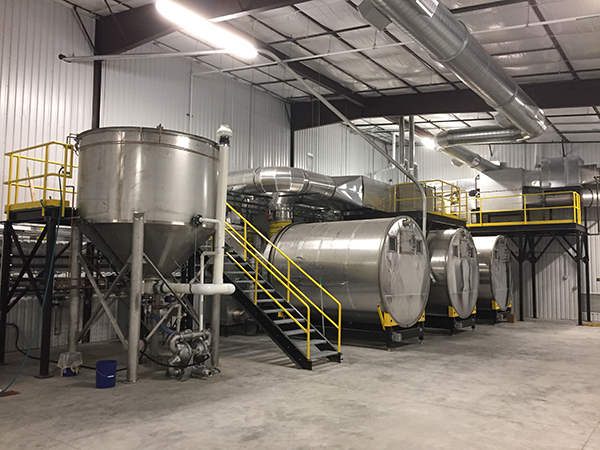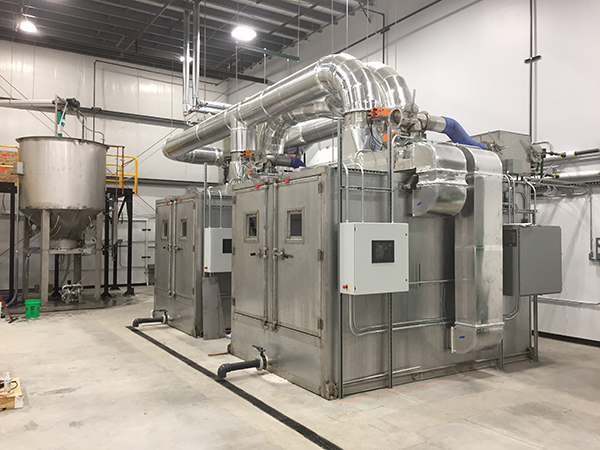 Next time you try a bottle of craft beer, or drink a glass at a local brew pub, be sure to toast a couple of your fellow SMACNA member companies.
Next time you try a bottle of craft beer, or drink a glass at a local brew pub, be sure to toast a couple of your fellow SMACNA member companies.
Bauer Sheet Metal and Fabricating, Inc., based in Muskegon, Mich., and Tri-County Sheet Metal in Livingston, Mont., are establishing themselves as players in the craft malt industry.
Established in 1932, Bauer supplies specialty fabrications and equipment for fruit processing, food processing, conveying, marine, and general industry. It was about six years ago when entrepreneur engineer Wayne Moore approached Bauer with an innovative design for a small-scale, self-contained malting system.
“When Wayne came to us with his malting system design, the Bauer team reviewed the package and knew there would be no issues with the manufacturing of this equipment,” said Bauer’s Operation Manager Ron Sejat.

Wyoming Malting received a 3-ton drum system from Malters Advantage.
“This equipment takes barley and turns it into malt for the beer industry,” Sejat explained. “This is very unique, and there are only a few companies that have equipment like ours in the world.”
Moore’s design features a variable steep tank and multiple germination-kiln vessels, equipped with a common air handler. In the steep tank, water is intermittently added to the grain, so that it will sprout. In the germinated seed, the malting process converts starches to sugar — which is important for brewing. Combining the germination and kiln drying in the same vessel streamlines the malting process, and allows for custom malting, thanks to fully automated temperature and humidity controls.
“We start the growth of the seed, stop it, then dry it,” Sejat explained.
“It’s kind of a niche market, with less than a couple hundred craft malt houses in the U.S,” said Moore, who is a partner in Bauer’s malting system fabrication business line.
Moore learned about the growing craft malting market through his part ownership of a micro-brewery in Seattle. All malts, including barley, contribute to the flavor and color of beer. Locally grown barley, carefully and custom malted, helps craft brewers create the unique brews that beer lovers desire.
Better tasting beer? Great! Unfortunately, Moore initially had trouble finding someone to make his design a reality.
“I couldn’t find anybody who could take on the whole project,” Moore recalled. “Bauer was able do the whole thing, from tip to tail.”

Great Lakes Malting chose a 2-vessel Saladin malting system for their business.
Sejat said the many years of experience and expertise is what puts the Bauer team on top of other sheet metal companies, something evident in their malting system fabrication.
“We actually use every aspect of the sheet metal trades in our malting systems,” Sejat continued, “Structural steel, sheet metal, HVAC, piping, stainless steel, galvanized. The manufacturing of the main structure as well as the main drum body, for example, requires the intelligence and experience of rolling heavy plate and food grade welding.”
Early in their partnership, Sejat and Moore had to attend a lot of trade shows to introduce potential customers to the benefits of their new systems. Sales grew slowly.
“We actually were hoping to be able the run at least three systems a year through our shop, which would really help during slow times,” Sejat said. “That didn’t happen, but we are starting to get there.”
“We’re finally getting established enough, with good word of mouth, so we don’t need as much marketing,” Moore added.
Increased Demand
Another measure of growth is an increase in demand for larger capacity malting systems. Bauer said they began building systems designed for processing one to two tons of barley per batch. Now their customers are ordering 10 to 12-ton batch systems — still small scale, compared to large commercial malting companies.
“For years, craft breweries had to order from the major malt houses that process batches in the hundreds of tons at a time,” Moore said. Craft brewers, he explained, don’t want to use the same ingredients as every other brewery in the country.
Sejat said malting system fabrication has grown to account for approximately 15 percent of Bauer’s annual revenue. Systems sales prices range from $500,000 to $5 million.
While Bauer’s biggest competitors include malting systems manufacturers in Germany and Canada, Sejat said they are confident they can grow their customer base across North America and beyond.
“The most surprising thing is that a large portion of our customers are farmers,” he added. They are either adding onto their family business or just looking to see what they can do with any of their byproducts.”
SMACNA contractors’ success in the craft malt market is certainly a reason to say ‘cheers.’ While it is another example of how the sheet metal and HVAC trades make life more comfortable and enjoyable, this time it’s possible to taste the SMACNA difference.
Bauer Craft malt fabrication details
- Duct sizes: 10” to 48” – almost all round
- Sheet metal gauges: 20 ga to 7 ga and heavier
- Heaters (indirect gas fired): 600,000 btu/hr up to 4.0 MM btu/hr +
- Blowers: 2 to 3 hp up to 100 hp